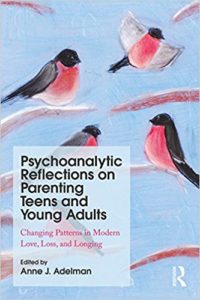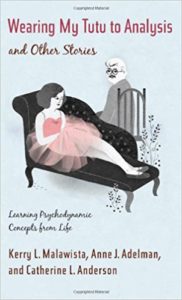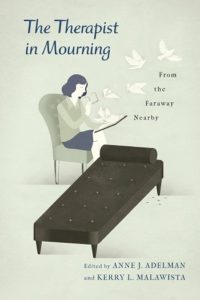Psychoanalytic Reflections on Parenting Teens and Young Adults: Changing Patterns in Love, Loss, and Longing
 Psychoanalytic Reflections on Parenting Teens and Young Adults explores the rich, multi-layered parent-child interactions that unfold during the period of separation and launching. While this is a necessary transitional time, parents inevitably experience feelings of loss and longing for the past as well as hope for the future.
Psychoanalytic Reflections on Parenting Teens and Young Adults explores the rich, multi-layered parent-child interactions that unfold during the period of separation and launching. While this is a necessary transitional time, parents inevitably experience feelings of loss and longing for the past as well as hope for the future.
With honesty, humor, and originality, the book brings together the voices of psychoanalysts, speaking frankly, and not just as professionals, but also as parents grappling with raising young adults in today’s fast-paced world. The contributors reflect on the joys, regrets, and surprises as well as the challenges and triumphs they experience as their children reach the threshold of young adulthood. They address a wide range of topics relevant to parents and practitioners alike-indeed to all those who are closely involved with the growth and maturation of today’s youth. Offering both a broad perspective and an intimate look at present-day parenting dilemmas, the chapters focus on five main areas of interest: raising youth in the digital age, developmental difficulties, evolving gender norms, social concerns and, finally, the building of resiliency.
Psychoanalytic Reflections on Parenting Teens and Young Adults offers an alternative lens to consider the complex challenges parents face in raising today’s teens and young adults, replacing the customary notion of “failure to launch” with the concept of “holding on with open arms.” The explorations in this book advance the idea that in the end, these struggles are essential for growth, buoyancy and wisdom. It will appeal greatly to psychoanalysts and psychoanalytic psychotherapists, as well as family therapists.
Wearing my Tutu to Analysis and Other Stories
 There couldn’t be a more appropriate method for illustrating the dynamics of psychoanalysis than the vehicle of story. In this book, Kerry L. Malawista, Anne J. Adelman, and Catherine L. Anderson share amusing, poignant, and sometimes difficult stories from their personal and professional lives, inviting readers to explore the complex underpinnings of the psychoanalytic profession and its esoteric theories. Through their narratives, these practicing analysts show how to incorporate psychodynamic concepts and identify common truths at the root of shared experience. Their approach demystifies dense material and the emotional consequences of deep clinical work. The book covers psychodynamic theory, the development of ideas, various techniques, the challenges of treatment, and the experiences of trauma and loss. Each section begins with a brief memoir by one of the authors and leads into a discussion of related concepts. Overall the text follows a developmental trajectory, opening with stories from early childhood and concluding with present encounters. The result is a unique approach enabling the absorption of psychodynamic concepts as they unfold across the life span.
There couldn’t be a more appropriate method for illustrating the dynamics of psychoanalysis than the vehicle of story. In this book, Kerry L. Malawista, Anne J. Adelman, and Catherine L. Anderson share amusing, poignant, and sometimes difficult stories from their personal and professional lives, inviting readers to explore the complex underpinnings of the psychoanalytic profession and its esoteric theories. Through their narratives, these practicing analysts show how to incorporate psychodynamic concepts and identify common truths at the root of shared experience. Their approach demystifies dense material and the emotional consequences of deep clinical work. The book covers psychodynamic theory, the development of ideas, various techniques, the challenges of treatment, and the experiences of trauma and loss. Each section begins with a brief memoir by one of the authors and leads into a discussion of related concepts. Overall the text follows a developmental trajectory, opening with stories from early childhood and concluding with present encounters. The result is a unique approach enabling the absorption of psychodynamic concepts as they unfold across the life span.
The Therapist in Mourning: From the Faraway Nearby
 For therapists caught between their grief and the empathy they provide for their clients, this collection explores the complexity of bereavement within the practice setting. It also examines the professional and personal ramifications of death and loss for the practicing clinician. Featuring original essays from longstanding practitioners, the collection demonstrates the universal experience of bereavement while outlining a theoretical framework for the position of the bereft therapist. Essays cover the unexpected death of clients and patient suicide, personal loss in a therapist’s life, the grief of clients who lose a therapist, disastrous loss within a community, and the grief resulting from professional losses and disruptions. The first of its kind, this volume gives voice to long-suppressed thoughts and emotions, enabling psychologists, psychiatrists, counselors, and other mental health specialists to achieve the connection and healing they bring to their own work.
For therapists caught between their grief and the empathy they provide for their clients, this collection explores the complexity of bereavement within the practice setting. It also examines the professional and personal ramifications of death and loss for the practicing clinician. Featuring original essays from longstanding practitioners, the collection demonstrates the universal experience of bereavement while outlining a theoretical framework for the position of the bereft therapist. Essays cover the unexpected death of clients and patient suicide, personal loss in a therapist’s life, the grief of clients who lose a therapist, disastrous loss within a community, and the grief resulting from professional losses and disruptions. The first of its kind, this volume gives voice to long-suppressed thoughts and emotions, enabling psychologists, psychiatrists, counselors, and other mental health specialists to achieve the connection and healing they bring to their own work.